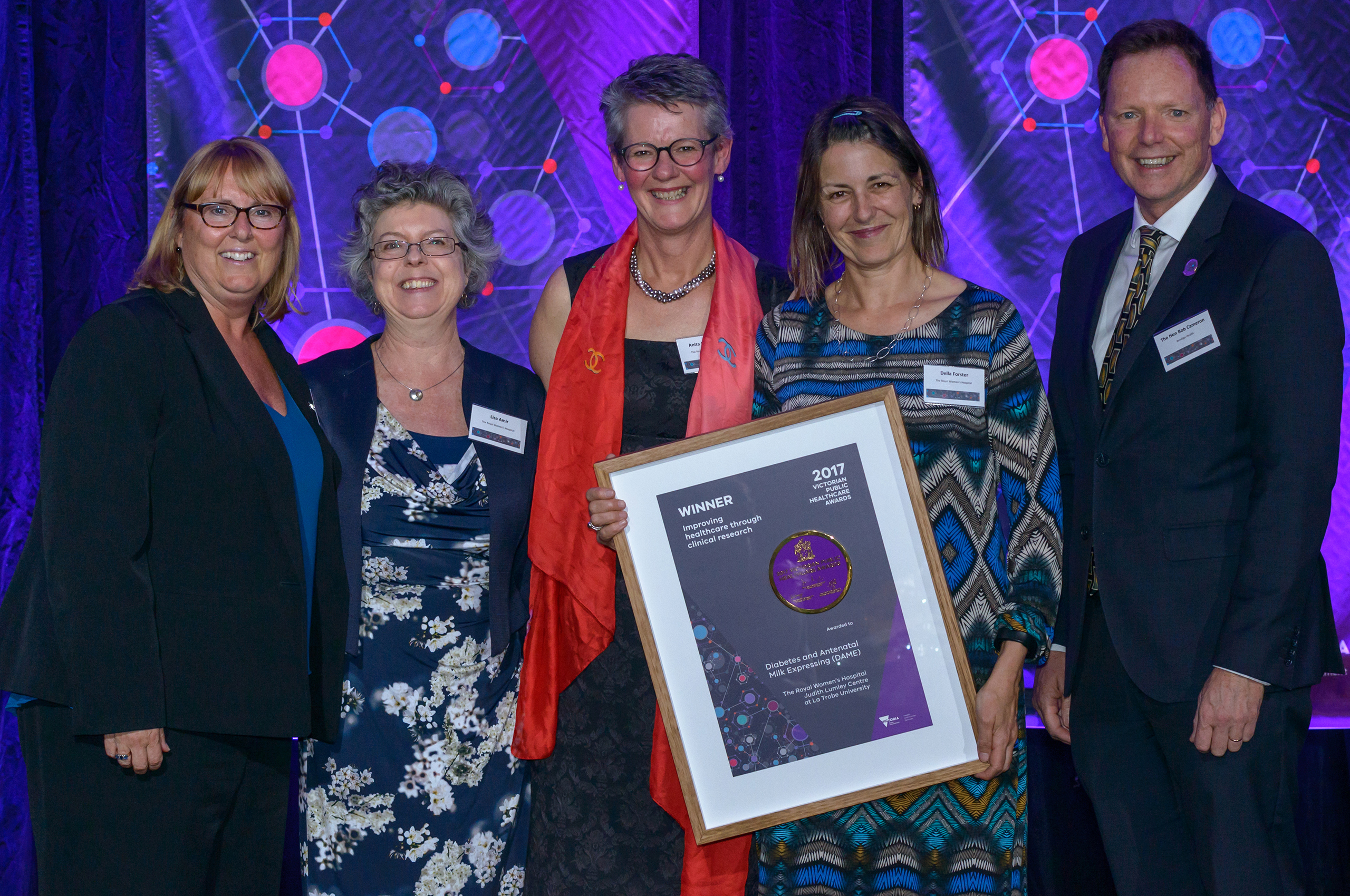DAME
Diabetes and antenatal milk expression

about
Diabetes is increasing globally and occurs in 8% of pregnancies. These pregnancies are considered to be at high risk of perinatal complications. Many maternity providers encourage these women to express colostrum before birth to have breast milk available should the infant need supplementary feeding to treat hypoglycaemia. Evidence for this practice was lacking.
This world first study has found that women with diabetes in a low-risk pregnancy can safely express breast milk in late pregnancy, with the study dispelling concerns that the practice could cause harm to babies.
We undertook a multi-site, two arm randomised controlled trial (RCT) of antenatal expression of colostrum in late pregnancy for women with diabetes in pregnancy to explore the safety and efficacy for mother, fetus and infant. The sites were the Mercy Hospital for Women, the Royal Women's Hospital, Monash Medical Centre, Barwon Health, the Royal Women's at Sandringham, and Frankston Hospital. We commenced recruiting women for the trial in June 2011 and finished recruiting in November 2015.
The findings pave the way for clinicians to recommend that low-risk pregnant women with diabetes in pregnancy express and store breast milk to give to their newborns in the event they develop hypoglycaemia (low blood sugar levels) – a condition that can cause serious health problems in newborns.
Read about the outcomes of this trial in this brochure [PDF/68KB].

DAME – winner of the Victorian Public Healthcare Award 2017
from left: Sue Matthews (CEO, Royal Wome’s Hospital), Lisa Amir, Anita Moorhead, Della Forster, The Hon Bob Cameron (Bendigo Health)
publications
Forster DA, Moorhead A, Jacobs S, Amir LH, Walker S, McEgan K, Opie G, McNamara C, Ford R. Is not testing a major change in clinical practice an ethical dilemma? Midwifery [Invited Letter] 2011;27(6):e301-e2. View this letter online
Forster DA, McEgan K, Ford R, Moorhead A, Opie G, Walker S, McNamara C. Diabetes and antenatal milk expressing: a pilot project to inform the development of a randomised controlled trial. Midwifery 2011;27(2):209-14. View this article online
Forster D. Changing attitudes. International Innovation, Health Partnership 2012;Dec.:82-4 [PDF 312KB}
Forster DA, Jacobs S, Amir LH, Davis P, Walker SP, McEgan K, Opie G, Donath SM, Moorhead AM, Ford R, McNamara C, Aylward A, Gold L. Safety and efficacy of antenatal milk expressing for women with diabetes in pregnancy: protocol for a randomised controlled trial. BMJ Open 2014; 4. View this article online
De Bortoli J, Amir LH. Is onset of lactation delayed in women with diabetes in pregnancy? A systematic review. Diabet Med 2016; 33(1):17-24.
Publications after trial completion:
Forster DA, Moorhead AM, Jacobs SE, Davis PG, Walker SP, McEgan KM, Opie GF, Donath SM, Gold L, McNamara C, Aylward A, East C, Ford R, Amir LH. Advising women with diabetes in pregnancy to express breastmilk in late pregnancy (Diabetes and Antenatal Milk Expressing [DAME]): a multicentre, unblinded, randomised controlled trial. The Lancet. 2017; 389(10085):2204-2213
Amir LH, Moorhead AM, Forster DA, Walker SP. Health Check: is it safe to express milk before giving birth? The Conversation. 2 June 2017
La Trobe University media release 2 June 2017
Moorhead AM, Amir LH, Forster DA, Crawford SB. 'Is there any point in me doing this?' Views and experiences of women in the Diabetes and Antenatal Milk Expressing (DAME) trial. Matern Child Nutr 2022; 18(2):e13307. https://doi.org/10.1111/mcn.13307
Moorhead AM, Amir LH, Crawford SB, Forster DA. Breastfeeding outcomes at 3 months for women with diabetes in pregnancy: Findings from the Diabetes and Antenatal Milk Expressing randomized controlled trial. Birth 2024; 51(3):508-20. https://doi.org/10.1111/birt.12807
Moorhead AM, Forster DA, Donath S, De Bortoli J, Amir LH. Does antenatal expressing affect onset of lactogenesis for women with diabetes? Results from a randomised controlled trial and cohort study. Aust N Z J Obstet Gynaecol 2024; Online ahead of print. https://doi.org/10.1111/ajo.13929
more information
Who is funding the study?
This is a four-year project funded by the National Health and Medical Research Council of Australia (NHMRC). NHMRC Project Grant no. 1005345.
Privacy and access to information
Information collected is kept confidential and the data will be used only for the purposes of this study. We have research ethics approval to conduct the DAME trial.
Australian and New Zealand Clinical Trial Registry Trial number: ACTRN12611000217909
Further information
The DAME trial is being co-ordinated at the Royal Women's Hospital, Mercy Hospital for Women, the Monash Medical Centre, Barwon Health, the Royal Women's at Sandringham, and Frankston Hospital by Anita Moorhead.
For more information about the DAME trial, please email Professor Della Forster at d.forster@latrobe.edu.au or Ms Anita Moorhead at a.moorhead@latrobe.edu.au or phone (03) 8345 2932.
